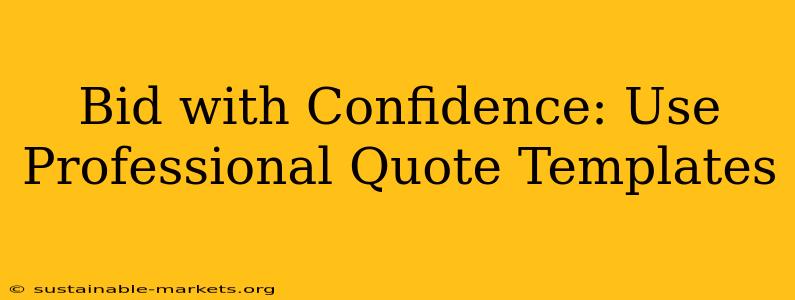Winning bids require more than just competitive pricing; they demand professionalism and clarity. A poorly formatted quote can cost you the job, regardless of how competitive your pricing is. That's where professional quote templates come in. They streamline the bidding process, ensuring your proposals are clear, concise, and leave a lasting positive impression on potential clients. This comprehensive guide explores the importance of using professional quote templates and how they can significantly improve your bidding success rate.
Why Use Professional Quote Templates?
Professional quote templates offer numerous advantages over hastily created documents. They provide a structured framework that ensures all crucial information is included consistently across all your bids. This consistency projects professionalism and builds trust with clients. Think of it like this: would you trust a company that sends you a handwritten, messy quote versus one with a clean, well-organized, branded template?
Here's a breakdown of the key benefits:
- Professionalism: A well-designed template instantly elevates your bid's perceived value. It demonstrates attention to detail and a commitment to excellence.
- Efficiency: Pre-designed templates save time and effort. You simply fill in the blanks, rather than starting from scratch each time.
- Consistency: Every quote will follow the same format, ensuring consistency in branding and information presentation.
- Reduced Errors: Structured templates minimize the risk of overlooking crucial details or making mistakes.
- Improved Client Experience: Clear, well-organized quotes make it easy for clients to understand your offer and compare it to others.
- Better Tracking: Using a consistent template makes tracking your bids and managing your projects simpler.
What Information Should Your Quote Template Include?
A comprehensive quote template should contain all the necessary information for a client to make an informed decision. Here's a checklist:
- Your Company Information: Name, address, phone number, email address, website, and logo.
- Quote Number and Date: For easy identification and tracking.
- Client Information: Name, address, contact person, and contact details.
- Project Description: Clearly outline the scope of work, including specific deliverables and timelines.
- Itemized Pricing: Break down each item or service with a clear description and its corresponding price. Avoid ambiguity.
- Total Price: Clearly state the overall cost, including any taxes or additional fees.
- Payment Terms: Specify the payment schedule, accepted payment methods, and due dates.
- Terms and Conditions: Include your standard terms and conditions, covering liability, warranties, and other important legal aspects.
- Acceptance Clause: Include a clear section for the client to sign and date, indicating their acceptance of your quote.
What Types of Quote Templates Are Available?
The best template for you will depend on your industry and business needs. However, some common types include:
- Simple Quote Templates: Ideal for smaller projects with fewer line items.
- Detailed Quote Templates: Suitable for larger, more complex projects that require a more comprehensive breakdown of costs.
- Service Quote Templates: Specifically designed for service-based businesses.
- Product Quote Templates: Best for businesses that sell products.
- Construction Quote Templates: Include specialized information relevant to the construction industry.
Where Can I Find Professional Quote Templates?
Numerous resources offer professional quote templates, both free and paid. Some popular options include:
- Online Template Marketplaces: Sites like Canva, Adobe Express, and Envato Elements offer a wide selection of templates.
- Software Solutions: Project management and accounting software often includes quote generation features.
- Microsoft Word or Google Docs: While less sophisticated, these tools allow for basic quote creation.
How to Choose the Right Quote Template for Your Business
Selecting the right template involves considering your specific needs. Ask yourself:
- What type of business do I have? (Service, product, etc.)
- What is the complexity of my projects? (Simple or complex)
- What level of branding do I need? (Basic or highly customized)
- What's my budget? (Free templates or paid premium options)
By carefully considering these factors, you can choose a template that effectively represents your business and enhances your bidding process.
How Can I Make My Quote More Compelling?
Beyond the template itself, consider these strategies to make your quote more appealing:
- Highlight Your Unique Selling Proposition (USP): What sets you apart from the competition? Emphasize this in your quote.
- Include Visuals: Where appropriate, use images or diagrams to illustrate your proposal.
- Proofread Carefully: Errors undermine credibility. Thoroughly proofread your quote before sending it.
- Personalize Your Quote: Tailor your quote to the specific client and their needs.
Using professional quote templates significantly improves your chances of winning bids. By presenting clear, concise, and professionally formatted quotes, you demonstrate competence and build trust with potential clients. Investing the time to find and implement a suitable template will contribute significantly to your long-term success.

